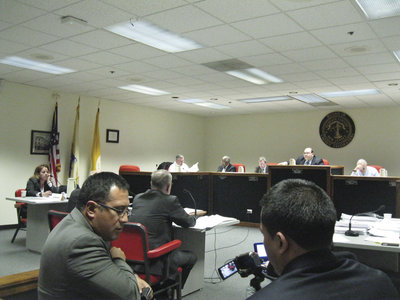A move made in early 2012 to save money on the transport of election machines may have backfired in the wake of Hurricane Sandy and may pose potential problems for other out of county service providers over the next two years once the Pulaski Skyway is closed.
At the Feb. 25 caucus, the county freeholders were asked to pay additional costs because a vendor located elsewhere in New Jersey expended time and gasoline attempting to find alternate voting sites when the storm made original sites unusable as a result of flooding or lack of power.
Despite using a local moving company in the past, the freeholders opted to remove a provision in their bid specification that required movers to be within 20 miles of Hudson County.
At the time, election officials had argued against the move, saying the local company was well versed in the location of all the polling places throughout Hudson County, and knew local streets in the event of a problem.
But faced with increases in the annual county budget, freeholders hoped to and eventually successfully received a lower bid from Simonik Moving of Bound Brook.
“It is well-known what is happening, and anyone doing business with Hudson County will have to take this into account.” – Bill O’Dea
____________
While the $12,500 additional cost might have been covered by Sandy-related reimbursement, the bill from the moving company was submitted late, and was further delayed by a county official in charge of the billing cycle who became ill.
Freeholder Bill O’Dea said these delays made it impossible to seek reimbursement, and also pointed to a weakness in county contracts for other services. Many vendors providing goods and services to Hudson County are located outside the county, and these might well face increases in costs with the closing of the Pulaski Skyway – which is expected to close inbound lanes on April 12. The repairs are expected to last two years.
Jersey City officials have already outlined plans that will restrict traffic to specific corridors. Many turns on to other streets that traffic could previously make will be illegal and will likely have a similar impact on some deliveries as Sandy did on the delivery of election machines.
Fearing that these vendors will also seek increases, O’Dea said he wants clauses included in future contracts that will require the vendors to eat the additional costs associated with the tie up.
“This is not a secret,” he said. “It is well-known what is happening, and anyone doing business with Hudson County will have to take this into account. If they have to come in at 4 a.m. to avoid traffic, then that’s what they should do.”
As far as the election machine delivery contract, he said that illness by the owner or the county official was not an acceptable excuse for the late billing, and that he may ask the county not to pay the additional bill.
Election machines will have to be replaced
Freeholders learned last month the county may have to fork over $4 million to replace its 600 election machines. This is because the so-called new technology that was adopted a decade ago for the current machines is already out of date.
County election officials said the technology wasn’t contemporary even when the county adopted it in 2004, but was based on technology developed in the early 1990s.
Hudson County adopted the paperless computer-operated machines in 2004 to replace mechanical machines that were used for almost two decades prior to that. But the parts for the mechanical machines became more difficult to find over the years.
The change came when the federal government pushed to modernize voting machines nationwide in the wake of the 2000 presidential election and problems associated with older technology.
But the county Superintendent of Elections office has informed the freeholders that the machines currently used are no longer being made and that parts once more are becoming more and more difficult to find. Some machines are not used during elections because they are waiting for parts which are generally supplied from cannibalizing machines that other districts are no longer using.
At some point in the near future, the county will have to buy a new set of machines.
Freeholder Chairman Jose Munoz said he did not trust the existing machines because they did not have a print out that could prevent fraud. While election officials claim the current machines have a number of safeguards, the best new technology that would provide a paper readout would utilize scanners. This would pose additional potential problems for voter fraud, because proof of who a voter voted for could be used as a method for purchasing votes, officials said.
Al Sullivan may be reached at asullivan@hudsonreporter.com.
